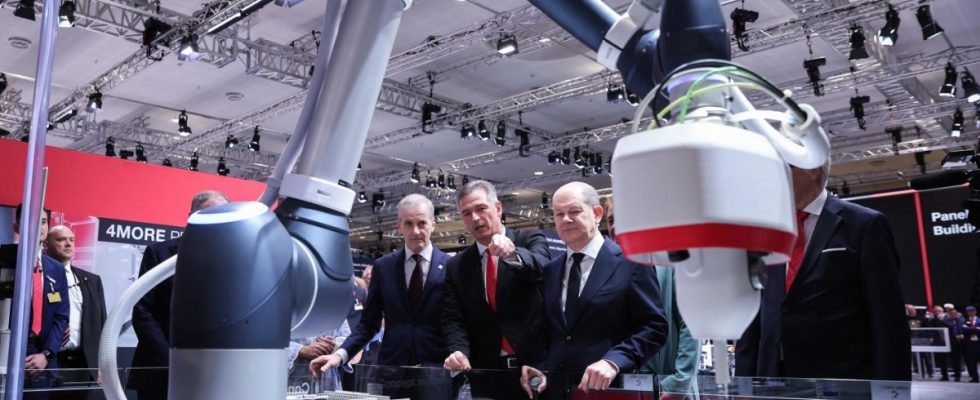The morning after, Siegfried Russwurm was his old self again. The powerful lobbyist who criticizes the traffic light government. The President of the Federal Association of German Industry, who says that the past two years have been lost years for Germany as a business location. In his opening speech at the Hanover Trade Fair on Sunday evening, Russwurm praised German industry, raved about its innovative strength, and did not say a critical word in the direction of Federal Chancellor Olaf Scholz, who is sitting in the front row in the congress center in Hanover. The hall is full. And you don’t argue in front of guests. Norway is the partner country of the industrial show this year and Prime Minister Jonas Gahr Støre is also sitting in the front row.
Scholz used his speech for a delayed reply to the interview that Russwurm gave at the beginning of April South German newspaper had given. He praised the work of the traffic light, including his: the faster pace in the expansion of renewable energies, the power plant strategy, the plans for the hydrogen network core network. We now have all the elements together for the energy supply of the future. The journey there was “exhausting and demanding”. And then Scholz speaks directly to the lobbyist: “If you ask me, dear Mr. Russwurm, then those were two turnaround years.” Scholz used the word turnaround a few times in his speech. This is a language that managers like Russwurm understand. Business economists describe a turnaround as the point at which a company leaves losses behind and starts making a profit again.
The judgment on the situation of the company in Germany seems to be a question of perspective. Scholz and Russwurm look like two people looking at the German company from opposite locations. They sometimes sound as if they are talking about parallel worlds: in one, Scholz’s world, things are going well, and the company’s management, i.e. the traffic light government, is pursuing a “modern supply policy” when it invests in infrastructure for affordable energy ensure that bureaucracy is reduced, said Scholz. Supply policy. Another word like that, it comes from economic policy, which, according to some lobbyists, Scholz is lacking. The last two years, as Russwurm also said in the SZ interview, were also lost years of economic policy. The gap between industry and traffic lights has not become smaller.
Germany is dragging the other countries in Europe down with it
In the world of industry that Russwurm speaks for, things aren’t going so well right now. “We are not happy about the overall economic situation in Germany this year,” said Russwurm in the BDI press conference on Monday, the day after. “We have the data, the facts. We don’t talk about could and want.” For Russwurm, everything in Germany sounds like a minor key, “it’s not a pessimism… The facts are what they are.”
So, if you want to express it in tonal terms: Industry minor, Chancellor major. Russwurm also has a “simple explanation” for the discrepancy in perception. The Chancellor describes “input measures” from the federal government, which he doesn’t deny at all. “But as entrepreneurs we are used to looking at what comes out of it. What the federal government has done so far is worthy of all honor, but it is not enough.” In terms of economic growth, Germany is in last place in an international comparison. Personally, he and the Chancellor don’t have any grudges against each other, says Russwurm: “We just see some things differently.” Germany cannot afford a further decline in industrial production.
The economy in the euro area is only expected to grow by a good half a percentage point in real terms this year, according to Russwurm. Germany is dragging the other countries in Europe down with it. “If we’re lucky,” there will be enough growth in Germany of 0.3 percent, but only if consumer spending finally picks up and investments don’t fall any further. The BDI expects industrial production in Germany to fall by 1.5 percent in 2024: “We are more followers than drivers.”
Russwurm speaks for the entire German economy, i.e. for energy-intensive sectors such as the chemical and cement industries, but also for mechanical engineering, the electrical and digital industries, where the share of energy in costs is significantly smaller. Gunther Kegel, President of the Electrical and Digital Association ZVEI, and Karl Haeusgen, President of the Mechanical Engineering Association VDMA will also be joining Russwurm at the associations’ press conference. Their demands are similar to those of the BDI: energy costs that can be planned in the long term and lower network charges, a containment of, as Kegel says, “bureaucratic over-regulation fantasies”, and a reduction in corporate taxes.
The economic and geopolitical environment is “very, very challenging,” said VDMA President Haeusgen in the press conference on Monday. There is some praise for the traffic light reforms and more criticism. The Growth Opportunities Act could have been an opportunity, he says, “unfortunately it has become a toy train.” Haeusgen says he lacks the “passion for freedom” in current economic policy: “We haven’t had a chancellor with passion and interest in the economy for many years.” It’s difficult for him to say that now, but then Haeusgen says it anyway. The last person who comes to mind is Gerhard Schröder. The traffic light recognized the importance of the industry. Haeusgen highly praises Finance Minister Christian Lindner and also Federal Economics Minister Robert Habeck, who is approachable and open to objectively correct ideas such as CCS, i.e. the capture and injection of carbon dioxide. And the Chancellor? “Olaf Scholz is what he is,” says Haeusgen: “not that extroverted and certainly not a party animal.”

